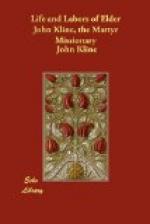The interval between the last given date and MONDAY, February 15, has nothing in it claiming special notice. But here he says: “To-day I attended the funeral of little Susanna Brower, who died yesterday morning. As it is our privilege to ’rejoice with those who do rejoice,’ so it is our duty to ’weep with those that weep.” I could but weep to see the remains of this interesting little girl laid in the cold and silent grave. I think it was the ancient Romans who personified DEATH in the form of a walking skeleton, scythe in hand, cutting down whatever the whim of his fancy might suggest. This representation may accord with the relentless strokes his scythe is sometimes seen to make; but the light of heaven reveals a Hand that holds his bony arm within its grasp; and that Hand is the hand of our God. For,
“’Not a sparrow to the ground
may fall
But our Father’s in it: Heart
of Love that governs all.
Even the very hairs of your head are all
numbered.’”
“Heaven is largely made up of children; and until every crown shall have a head, and every white robe have a wearer, God will recall his own.”
WEDNESDAY, March 16. Brother Daniel Trump and Sister Polly Moyers were both buried to-day. These make six funerals that I have attended in the space of four weeks.
“One by one, we cross the River;
One by one, we’re ferried
o’er;
One by one, the crowns are given
On the bright, celestial shore.”
Sermon by Elder John Kline.
Preached at the Old Brick Meetinghouse, Augusta County, Virginia, Sunday, April 24.
TEXT.—Lest there be any ... profane person, as Esau, who for one morsel of meat sold his birthright. For ye know how that afterward, when he would have inherited the blessing, he was rejected: for he found no place of repentance, though he sought it carefully with tears.—Heb. 12:16, 17.
Esau and Jacob were twin sons of Isaac. But Esau was born first; and this, according to the law of primogeniture in that day, gave him special privileges, among which was the right on his part to a double portion of the heritage to be received from the father.
This right Jacob treacherously bought of his brother Esau. Rebekah, their mother, was favorable to the contract, and laid the plan for its successful completion. Esau had been unsuccessful in his pursuit of game, and soon found himself in a famishing condition. Jacob took advantage of this, and proposed to purchase the birthright. He said to Esau: “Sell me this day thy birthright.” And Esau said: “Behold, I am at the point to die; and what profit shall this birthright do to me?” And he sold his birthright to Jacob. “Then Jacob gave Esau bread and a mess of lentiles; and he did eat and drink, and rose up and went his way: thus Esau despised his birthright.”
Esau is here regarded as a profane or wicked person, because he did not more highly esteem the blessing to which he was born. Paul refers to this fact, to teach us that it is our duty, as the regenerated or “firstborn” children of God, to place a very high value upon our relation to him conferred by this birth.




